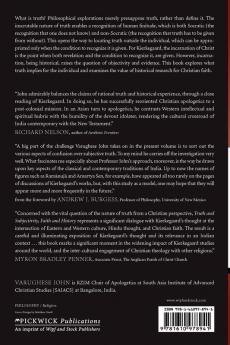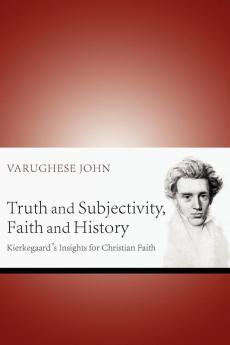English
Paperback
₹1842
₹2164
14.88% OFF
(All inclusive*)
Delivery Options
Please enter pincode to check delivery time.
*COD & Shipping Charges may apply on certain items.
Review final details at checkout.
Looking to place a bulk order? SUBMIT DETAILS
About The Book
Description
Author
Synopsis: What is truth? Philosophical explorations have merely presupposed truth rather than define it. The inscrutable nature of truth is a recognition of human finitude which is both Socratic (the recognition that one does not know) and non-Socratic (the recognition that truth has to be given from without). This opens the way to locating truth outside the individual which can be appropriated only when the condition to recognize it is given. For Kierkegaard the incarnation of Christ is the point when both revelation and the condition to recognize it are given. However incarnation being historical raises the question of objectivity and evidence. This book explores what truth implies for the individual and examines the value of historical research for Christian faith. Endorsements: John admirably balances the claims of rational truth and historical experience through a close reading of Kierkegaard. In doing so he has successfully reoriented Christian apologetics to a postcolonial mission. In an Asian turn to apologetics he contrasts Western intellectual and spiritual hubris with the humility of the devout idolater rendering the cultural crossroad of India contemporary with the New Testament. --Richard Nelson author of Aesthetic Frontiers A big part of the challenge Varughese John takes on in the present volume is to sort out the various aspects of confusion over subjective truth. To my mind he carries off the investigation very well. What fascinates me especially about Professor Johns approach moreover is the way he draws upon key aspects of the classical and contemporary traditions of India. Up to now the names of figures such as Ramānujā and Amartya Sen for example have appeared all too rarely on the pages of discussions of Kierkegaards works but with this study as a model one may hope that they will appear more and more frequently in the future. --from the foreword by Andrew J. Burgess Professor of Philosophy University of New Mexico Concerned with the vital question of the nature of truth from a Christian perspective Truth and Subjectivity History and Faith represents a significant dialogue with Kierkegaards thought at the intersection of Eastern and Western culture Hindu thought and Christian faith. The result is a careful and illuminating exposition of Kierkegaards thought and its relevance in an Indian context . . . this book marks a significant moment in the widening impact of Kierkegaard studies around the world and the intercultural engagement of Christian theology with other religions. --Myron Bradley Penner Associate Priest The Anglican Parish of Christ Church Author Biography: Varughese John is RZIM Chair of Apologetics at South Asia Institute of Advanced Christian Studies [SAIACS] at Bangalore India.
Delivery Options
Please enter pincode to check delivery time.
*COD & Shipping Charges may apply on certain items.
Review final details at checkout.
Details
ISBN 13
9781610978941
Publication Date
-26-09-2012
Pages
-178
Weight
-250 grams
Dimensions
-152x229x9.63 mm











